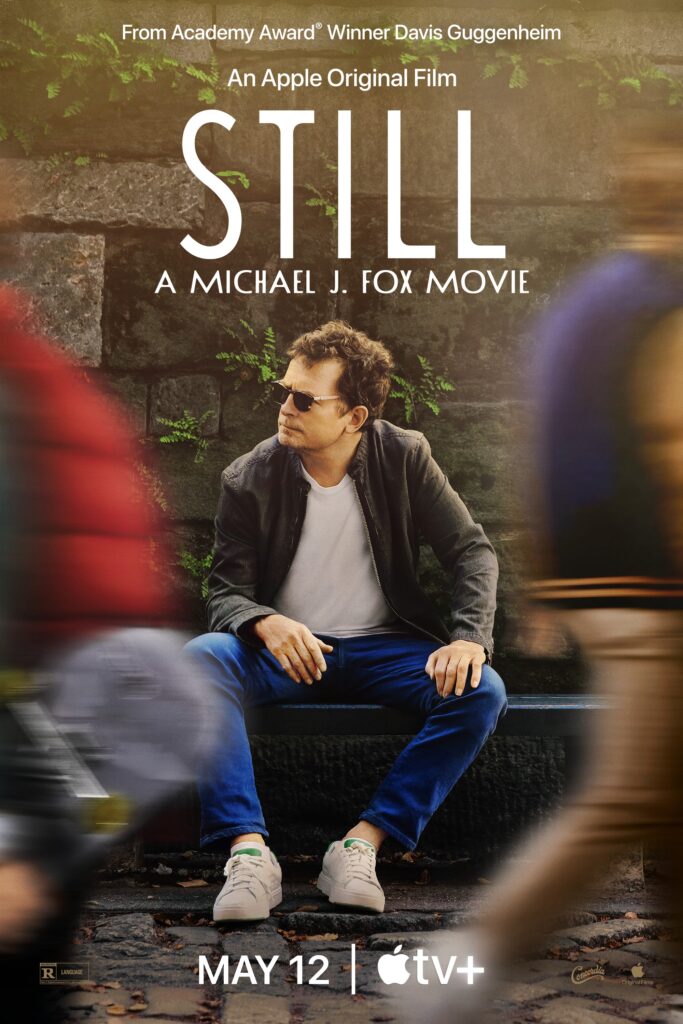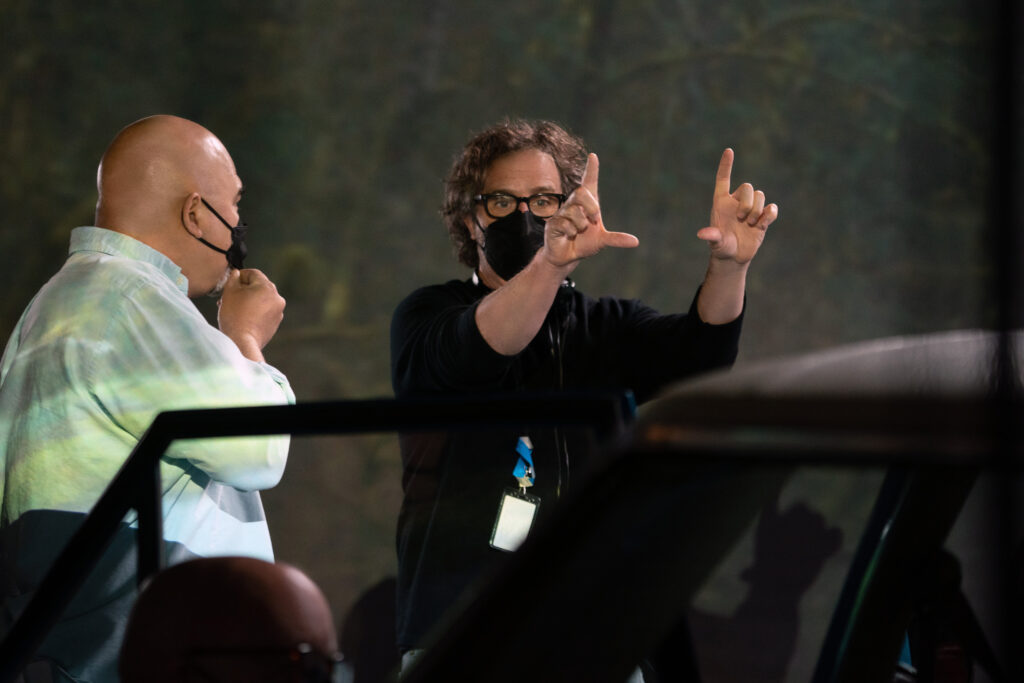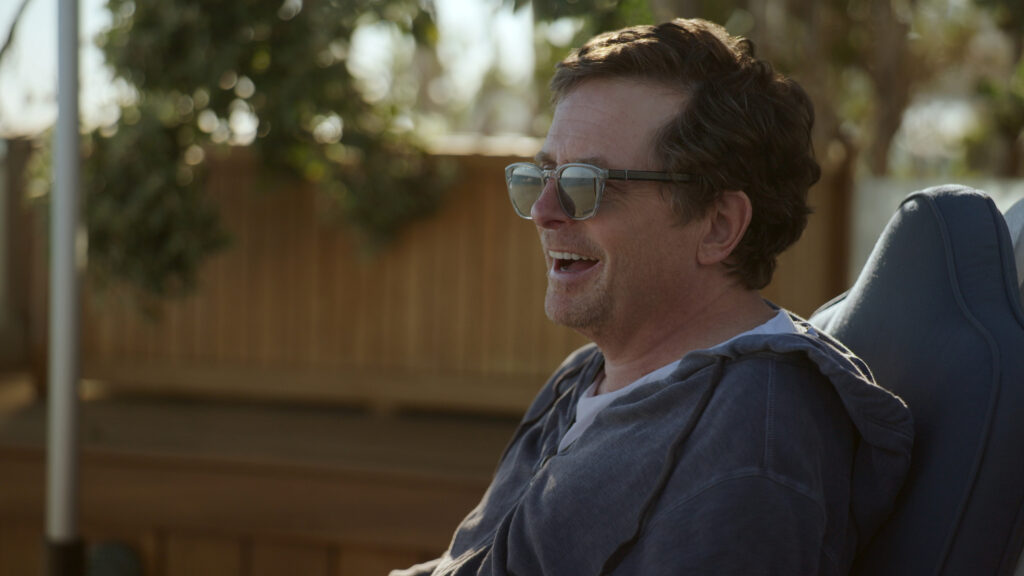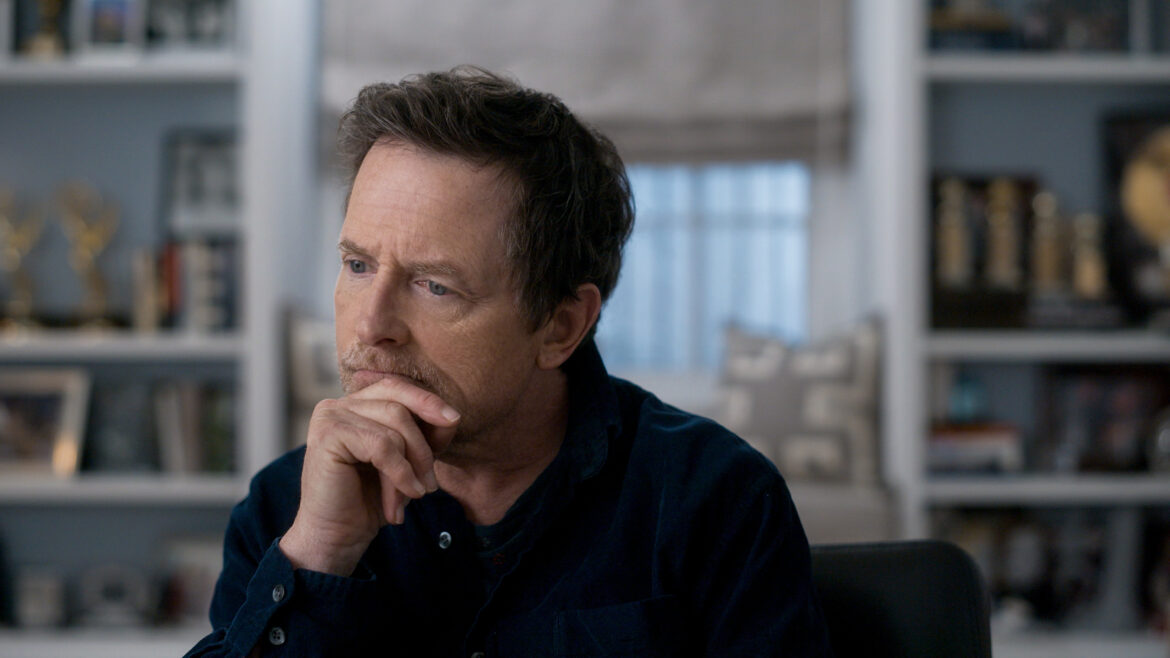By Kirsten Coachman
“Still: A Michael J. Fox Movie,” the newest documentary from Academy Award winner Davis Guggenheim (“An Inconvenient Truth”), sets the film’s tone early on during an opening exchange between the director and his star subject Michael J. Fox.
“Everybody talks now about owning their narrative. So, the sad sack story is Michael J. Fox gets this debilitating disease, and it crushes him,” says Guggenheim.
After a brief beat, Fox responds, “Yeah, that’s boring.”
And Fox’s story—and Guggenheim’s film to boot—is anything but boring.

“Still” is an unwavering look at Fox’s life and onscreen career in the ’80s and ’90s. The film traces the actor’s rise to success on “Family Ties,” and box office takeover with “Back to the Future” and “Teen Wolf,” to private struggles with alcohol and an early diagnosis of Parkinson’s disease at the age of 29, shedding new light on the once “bigger than bubblegum” star.
Through candid sit-down interviews with the now 61-year-old actor and scenes from his home life, a curtain is lifted on Fox’s current reality living with Parkinson’s: troubles with walking and falling, and, at times, even talking. Yet, he maintains a keen sense of humor about it all.
Guggenheim crafted a dynamic portrait of a beloved pop culture icon through both words and visuals, as the film is ingeniously told through a variety of media. This includes past interviews, behind-the-scenes footage, Fox’s acting projects and audiobooks, and reenactments.
While in town for the 2023 SFFILM Festival last month, Art U News had the opportunity to chat with Guggenheim over the phone to learn more about the making of “Still.”
I know the film is based on Michael’s books. Was there something specific that he wrote or spoke about that you were like, I absolutely have to make a film about this guy?
I read this thing in the New York Times. It was an interview with him, and he talked about this fall he had. He talks about it in his last book, “No Time Like the Future.” And, you know, he’s recovered from this operation. His daughter says, “Let me stay overnight to help you get ready.” He’s shooting a Spike Lee movie. And he says, “No, no, no, I can, I can handle this.” And, of course, he’s alone in the morning. He’s got his coffee, he falls and breaks his shoulder. And he’s in so much pain that he can’t reach the phone. It’s kind of a horrific traumatic scene, but the way he writes about it—first of all, it’s just good storytelling, and then it’s also very wise and funny. And I was like, “Wow.” I had to rethink my impression of him. He was such a good writer, you know? Then I listen to his books, his books on tape, he reads them. What you hear in the movie is from those books on paper. They’re so good, and his voice is so appealing, and he tells the story so well. I was like, he’s doing half the work for me. [Laughs]
What was the pitch to him like, and was he on board right away?
[It was the best] pitch I’ve ever had. He had seen a documentary I made about the electric guitar with Jimmy Page and the Edge, and Jack White, a film called “It Might Get Loud.” And he approached me at a restaurant in Martha’s Vineyard years before and told me how much he liked it. And so, luckily, he’s seen my movies. We were both super excited to work together. And he had one request, and the only request throughout the entire process was no violins, which I took as no pitying.
And the hilarious thing was, is that when I was in the dubbing stage, and we were finished. And when you finish your mix, it’s kind of when you’re finishing the movie ’cause everything else is settled. And your score is in, but he hadn’t heard the new score, and I realized the score had a ton of violins in it. It’s like, “Oh no, I hope he meant that metaphorically.” [Laughs] But, so far, he hasn’t said anything.

When you’re preparing to sit down with him or any subject, what goes into your preparation? Is it re-listening to the books or revisiting films? Or do you have your own research method?
It’s interesting. The more I do it, the more I don’t prepare very much. My goal is to just get to know this person really well. And I’ve made a bunch of films about people who are pretty famous. And so I feel like my job is to pierce the veneer of what the person is presenting. And often, the people I work with are pretty famous. And sometimes that’s really hard. But Michael was just like an open book. He was very raw. Everything was on the table. We laughed a lot. I asked him tough questions, but I think ’cause of this Parkinson’s, he’s been through so much, like, what is he afraid of now? A lot of people wanna protect themselves. And I don’t think that was him. He’s like, “Look, I don’t walk so well. I’m older. My speech sometimes is a little hard to understand, but that’s me. Take me for who I am.” And you see that—I think that comes through in the movie.
Absolutely. I think part of the surprise of the movie is that he is so open and so forthcoming with what’s going on. Were you at any point surprised at how honest and how he was just kind of laying himself out there, whether it was giving you access to his sessions with his physical therapist or just being forthcoming and answering your questions?
Yeah. Usually, when you make a documentary, it’s just kind of an unspoken battle or negotiation. It’s like, I’m gonna try to get you to talk about something you don’t want to talk about. I’m gonna pretend to talk about something and get you to move on. It’s almost like, over time, how much do we trust each other? You know, and that was never on this, it’s really quite extraordinary. He was just like, here I am. And it’s very rare.
While watching the film, one of the things I didn’t know previously is that Michael was making “Teen Wolf” at the same time the original cast of “Back to the Future” was beginning their shoot. That’s such a great nugget of information, especially for what happens later down the line. Was there something that you didn’t know or maybe a favorite fact from your conversations with him?
You’re reminding me of this moment because I really wanted to make a bigger deal of it, actually. It was one of my favorite scenes in the book. It goes by fast in the movie, but I originally wanted to make more of a meal of it. He’s on a hiatus from “Family Ties,” and he’s doing this B-movie where he is putting on, you know, Alpaca hair, and it’s a tiny little low-budget movie. [Laughs]. And he’s drinking his lunch through a straw. … And it’s really worth visiting if you find that chapter in the book ’cause he’s very funny about it. It’s like, “Oh, this is pretty low rent.” And then he’s like, “What are those guys doing? Oh, those guys are scouting for that new Steven Spielberg, the Robert Zemeckis movie.” Oh, he’s so jealous. Kind of, “I can’t believe they’re doing that; I’m doing this.” And then, in a few weeks, he’s suddenly doing “Back to the Future.” It’s kind of amazing.
Yeah. Even watching the film again, I was like, I can’t believe that happened. “Back to the Future” was this huge thing. What a wild thing to have that happen, like weeks apart.
It’s amazing.

At the top of the film, but then later on, towards the end of the film, you guys discuss what it means to be still. I was wondering, at that point when you were asking him that, were you already sort of meditating on that potentially being the title?
The title came really late after that moment. But I knew it was a theme, this idea. Because like another big thing is that he’s always moving. He’s running, running, running. Even this little boy. Like he’s at the army base in Canada, stealing the chocolate and running, running, running, never stopping. And so, the opposite of that is stillness, right? It’s just funny when you make a movie, you have your plan, which we had, and then there’s the ideas that kind of come to the surface. And that was this idea of stillness. And, in some respects, he still isn’t still [laughs]. But he’s found something close to stillness, which is beautiful, which is something I envy, actually.
Interesting.
And I identify with this, maybe we all do, with this sense of like moving, moving, moving. … Or something even more fundamental, which is that we’re all very fragile. … I feel if I run really fast, I’ll forget about some of the heavier stuff, [laughs] about my mortality. I’ll forget about my fragility. And if you move really fast, you don’t have to deal with that stuff, you know? And so I think stillness is a kind of an aspiration.
I have to ask you about the editing because it’s fantastic. I loved all of the different elements and how they came together. As we discussed, the sequence of “Family Ties” and “Back to the Future” and the back and forth was a standout. What was the editing process like in putting Michael’s story together?
Well, Michael Harte, the editor, is a genius. And he brought things that I truly didn’t imagine possible. When you’re doing a film [that’s retrospective], you’re always thinking, “Well, what footage do I use to capture this?” And my solution was these recreations, which we did a lot of. But his solutions were reusing his movies and finding these incredible moments. And so I would put in storyboards for recreations, and he would put in footage, and it was sort of a wonderful back and forth, a wonderful battle between us that produced these different things. And that sequence we called “Moonlighting,” which went from “Family Ties” to “Back to the Future.” He’s working all night. It’s a collage of some of my ideas and some of his ideas. In the end, it was both of our ideas, but it was like that battle produced something that I didn’t expect.
To wrap things up, what do you hope audiences take away from the film and from Michael’s story?
I just want people to feel what I feel. You know, I’m so moved by him. I set out to make a movie, but working with him changed my life. I think of my life differently now. I had the incredible privilege of being in the same room with him, and maybe the movie can give people a little touch of that.
This interview has been edited for length and clarity.
“Still: A Michael J. Fox Movie” is now streaming on AppleTV+.
